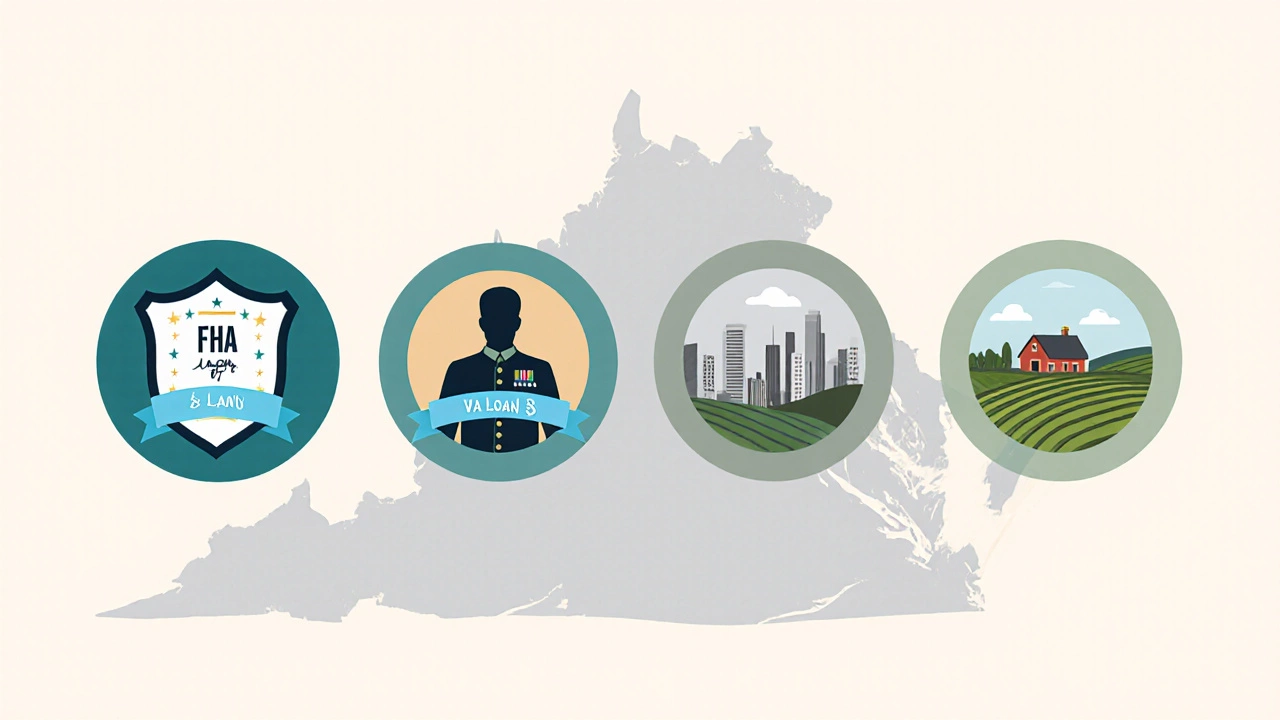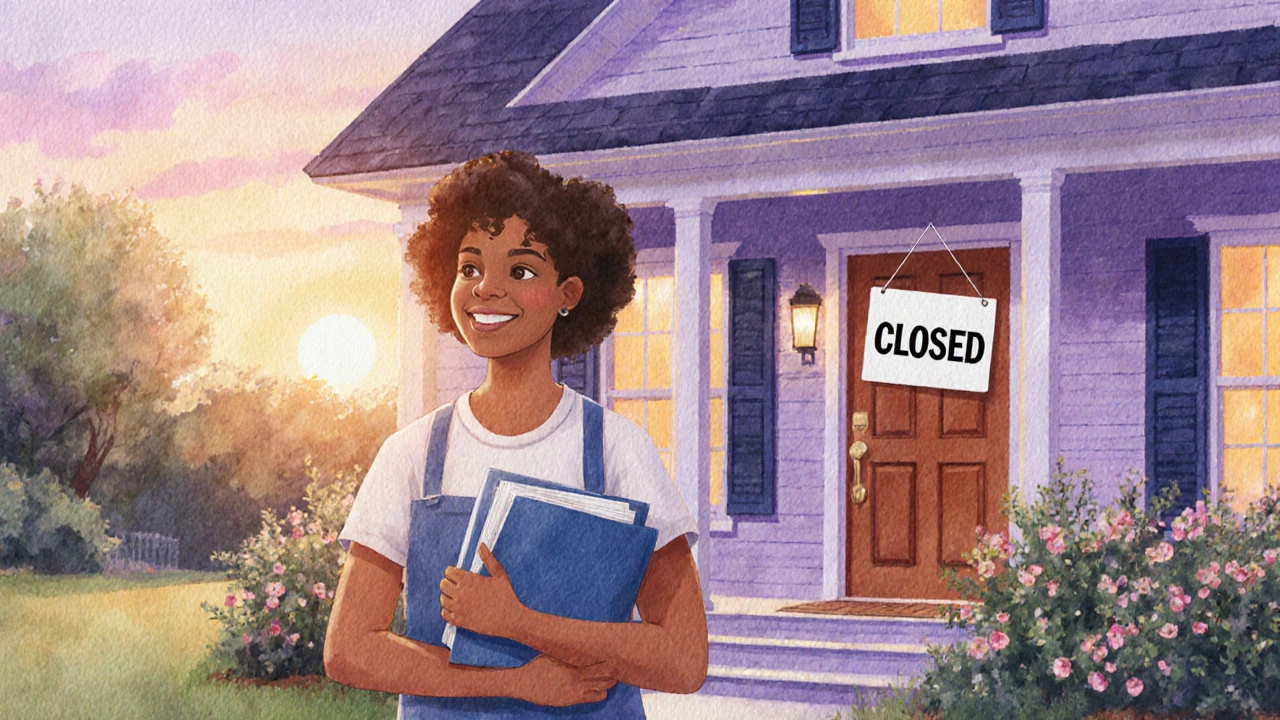Virginia First-Time Homebuyer Down Payment Calculator
How This Calculator Works
This tool helps you estimate your total cash requirements for a Virginia home purchase based on your home price, loan type, and available assistance programs. Enter your target home price and select your loan type to see how much you'll need to bring to closing.
Note: Virginia offers various down payment assistance programs (like VHA grants) that can significantly reduce your upfront costs. This calculator includes these options.
Calculate Your Down Payment
Your Cash Requirements
Thinking about buying your first house in Virginia? One of the biggest questions you’ll hear is how much cash you need to bring to the table. The answer isn’t a one‑size‑fits‑all number- it depends on the loan you choose, the programs you qualify for, and a few personal factors like credit score.
What a "down payment" really means
In simple terms, a down payment is the portion of the purchase price you pay upfront. Lenders finance the rest, and you repay that loan over time with interest. The size of the down payment influences two things: your loan‑to‑value (LTV) ratio and whether you’ll have to pay private mortgage insurance (PMI) or other fees.
First-time homebuyer is someone who has not owned a primary residence in the past three years. Many lenders treat these buyers specially, offering lower down‑payment thresholds or assistance programs.
In Virginia, the state government and local municipalities add a layer of home‑buyer assistance that can dramatically lower the cash you need. Let’s break down the main loan options and see how each one stacks up.
Loan options and their down‑payment rules
Each loan type has a baseline down‑payment requirement, but you can often go lower with grants or special programs.
FHA loan
FHA loan is a government‑backed mortgage insured by the Federal Housing Administration. The program is popular with first‑time buyers because the minimum down payment is only 3.5% of the home’s price. To qualify, you’ll need a credit score of at least 580 (some lenders accept 500 with a larger down payment). Because the loan is insured, you’ll pay an upfront mortgage insurance premium (UFMIP) of 1.75% of the loan amount, plus annual mortgage insurance.
VA loan
VA loan is for eligible veterans, active‑duty service members, and some surviving spouses. The big win? No down payment is required at all, as long as the home’s price falls within the VA’s loan limits for Virginia (which are $1,089,300 in most counties as of 2025).
You’ll still pay a funding fee- typically 2.3% of the loan amount for first‑time use-but that can be rolled into the loan balance.
Conventional loan
Conventional loan is a private‑sector mortgage that isn’t insured by the government. The standard down‑payment range is 5%-20%.
If you can put down at least 20%, you avoid private mortgage insurance (PMI). With 5%-19% down, you’ll pay PMI until you reach 20% equity.
USDA loan (bonus mention)
For rural Virginia properties, the USDA loan offers 0% down, similar to a VA loan, provided the home meets income and location criteria.
Virginia‑specific assistance programs
Virginia’s housing agencies add extra options that can shave thousands off your required cash.
Virginia Housing (VHA) programs
Virginia Housing (formerly VHA) runs several down‑payment assistance (DPA) initiatives. The most common is the Virginia Housing Homeownership program, which offers a 2%-5% grant that doesn’t need to be repaid.
Eligibility hinges on income limits (usually 80% of the area median income) and completing a home‑buyer education class.
Local city or county grants
Places like Arlington, Fairfax, and Richmond have municipal DPA funds. They often match a percentage of your own contribution, up to $15,000. The application timeline is usually tied to the fiscal year, so checking early is key.
Employer‑assisted housing
Some large employers in Northern Virginia (e.g., tech firms, government contractors) partner with Virginia Housing to offer up to $10,000 in assistance. If you work for one of these companies, ask HR about a housing benefits package.
How to calculate the cash you’ll need
- Pick a target home price.
- Choose the loan type you’re leaning toward.
- Apply the baseline down‑payment percentage.
- FHA: 3.5%
- VA: 0%
- Conventional: 5%-20%
- Subtract any DPA grants you qualify for.
- Add estimated closing costs (typically 2%-3% of the purchase price).
- Example: For a $300,000 home, closing costs might be $6,000-$9,000.
- Factor in reserves (lenders often ask for 1-2 months of mortgage payments saved).
Let’s run a quick scenario:
- Home price: $300,000
- Loan: FHA (3.5% down) → $10,500
- VHA grant: 2% of price → $6,000 (non‑repayable)
- Adjusted down payment: $10,500 - $6,000 = $4,500
- Closing costs (2.5%): $7,500
- Total cash needed up front: $4,500 + $7,500 = $12,000
This example shows how a grant can turn a $10,500 requirement into just $4,500.

Key factors that affect your down‑payment amount
Credit score plays a big role. Higher scores can unlock lower interest rates and sometimes lower DPA eligibility thresholds.
Loan‑to‑value (LTV) ratio is the loan amount divided by the appraised value. A lower LTV (meaning a larger down payment) reduces risk for lenders and can eliminate PMI.
Mortgage insurance is required for FHA loans and for conventional loans with less than 20% equity. Remember to count both the upfront premium and the monthly fee when budgeting.
Closing costs include appraisal fees, title search, recording fees, and prepaid items like property taxes and homeowners insurance. Even with a low down payment, you can’t skip these.
Common pitfalls and how to avoid them
- Assuming a low down payment means a cheap home. A lower down payment increases your monthly payment and total interest over the loan’s life.
- Skipping the home‑buyer education class. Many Virginia programs require it, and the class often uncovers hidden costs you might miss.
- Not checking the latest VA loan limits. They’re adjusted annually; using outdated numbers can lead to surprise re‑jections.
- Overlooking local DPA funds. Municipal grants can disappear after the fiscal year ends.
- Failing to budget for reserves. If your lender asks for two months of mortgage payments in reserve, you’ll need that cash ready before closing.
Quick checklist for first‑time buyers in Virginia
- Determine your target price range.
- Check your credit score; aim for 620+ for most FHA loans.
- Identify which loan type best fits your situation (FHA, VA, Conventional, USDA).
- Research Virginia Housing DPA programs and local city grants.
- Complete a state‑approved home‑buyer education class.
- Calculate total cash needed: down payment + grants - DPA + closing costs + reserves.
- Get pre‑approved before you start house hunting.

Comparison of loan types and minimum down‑payment percentages in Virginia
| Loan Type | Minimum Down‑Payment | Typical Credit Score Needed | PMI / Mortgage Insurance |
|---|---|---|---|
| FHA | 3.5% | 580 (620 preferred) | UFMIP 1.75% + annual MI |
| VA | 0% | Generally 620+ (depends on lender) | Funding fee (can be rolled) |
| Conventional | 5% (up to 20% without PMI) | 620+ (740+ for best rates) | PMI if <20% equity |
| USDA | 0% | 640+ (some lenders 620) | Annual guarantee fee |
Next steps after you have your cash amount
Once you know the exact figure you need, start gathering documents: recent pay stubs, tax returns, bank statements, and proof of any DPA grants you’ll receive. Schedule a pre‑approval with a lender that’s familiar with Virginia’s assistance programs. The pre‑approval will lock in your interest rate for a short period-perfect for a competitive market like Northern Virginia.
When you find a home, your real‑estate agent should submit the purchase contract with a clear contingency for appraisal and financing. The appraisal will verify the home’s value, which directly impacts the LTV ratio and, consequently, the down‑payment requirement.
Finally, attend the required home‑buyer education class, submit the DPA application, and keep a tidy folder of all approvals. A smooth closing day feels great, especially when you’ve already covered the cash side of the deal.
Frequently Asked Questions
Can I use a gift for my down payment?
Yes, most lenders allow gifted funds from a close family member or an approved charitable organization, but you’ll need a gift letter stating the money is a gift, not a loan.
Do I still need to pay closing costs if I get a 0% down loan?
Zero‑down loans eliminate the down‑payment portion, but closing costs still apply. Some DPA programs also cover part or all of those fees.
How long does a typical DPA application take?
Processing varies by program, but expect 2-4 weeks after you submit all required paperwork.
What is the maximum home price I can buy with a VA loan in Virginia?
For most of Virginia, the 2025 VA loan limit is $1,089,300. Some high‑cost counties may have higher limits.
Do I need private mortgage insurance with an FHA loan?
Yes, FHA loans require both an upfront premium (1.75% of the loan) and an annual mortgage insurance premium that’s paid monthly.
